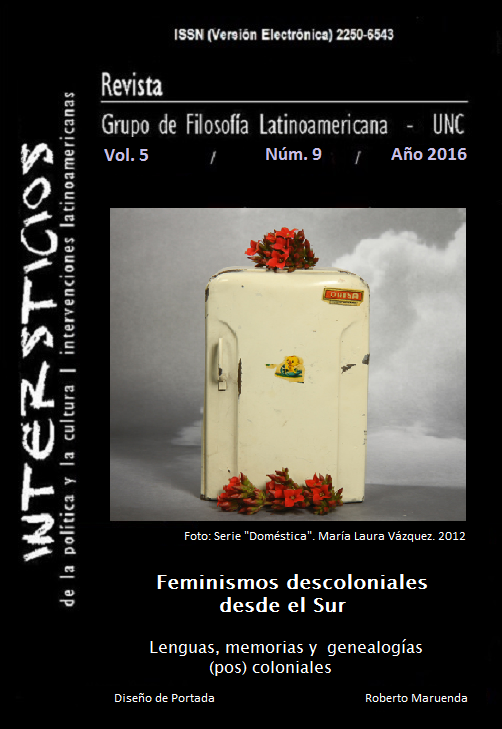Southern voices making border experience
Keywords:
narrative, migrations, nomadism, Latin American feminism women´s writingsAbstract
The voices of Juana Manuela Gorriti, Clorinda Matto Turner and Francesca Gargallo, and the voices of those other women who make space, do listening criteria compilation. They make the difference as thinkers women writing about women. They replicate collective spaces writing. They restitute in the community of writing the locus of enunciation. In this intertextuality are trademarks of experience (of women in exile, the nomad women, migrant women) as (un)certain feminisms making body at the border.Downloads
References
Alvarado, Mariana (2014) “Mujeres de América Latina: des(re)encuentros, tráfico de ideas y traducción” Revista Estudios. Filosofía Práctica e Historia de las Ideas. Mendoza, qellqasqa, 2014, vol.16, n.1, pp. 13-22. http://www.scielo.org.ar/scielo.php?pid=S1851-94902014000100002&script=sci_arttext
___ “Tramas feministas y poscoloniales en discursos pedagógicos dde mujeres de fines del siglo XIX e inicios del siglo XX”. II Congreso de Estudios Poscoloniales III Jornadas de Feminismo Poscolonial. Buenos Aires. Biblioteca Nacional. 9, 10 y 11 de diciembre de 2014 Organizadores: IDAES | UNSAM, Programa Sur Global, Consejo Latinoamericano de Ciencias Sociales Ponencia publicada en Actas on line: http://www.idaes.edu.ar/pdf_papeles/3-1%20Alvarado.pdf
___ (2010) “Contrabandistas entre testigos sospechosos y autómatas parlantes.” Revista Sul Americana de Filosofía y Educaçâo. Brasilia D F, Nº 14, mayo/octubre. http://filoesco.unb.br/resafe/numero014/
___ “Alejandro de Oto (Comp.) Tiempos de homenajes/tiempos descoloniales: Frantz Fanon. América Latina.” En: Estudios. Filosofía Práctica e Historia de las Ideas. Mendoza, Dic. 2012. nº 14. pp. 179-181.ISSN 18519490 (SCIELO).
___ “Gargallo Francesca. Ideas feministas latinoamericanas”. en: Estudios de Filosofía Práctica e Historia de las ideas. Vol 11, nº 2. julio/noviembre 2009.
Bidaseca, Karina (2011) “Mujeres blancas tratando de salvar a mujeres de color café: desigualdad, colonialismo jurídico y feminismo postcolonial” en: Andamios. Revista de investigación Social. México: Universidad Autónoma de la Ciudad de México.
Braidotti, Rosi 1995 Soggetto nomade, Feminismo e crisi della modernità (trad. Di Ana Maria Crispino e Tina D’Agostini) Roma, Donzelli editore.
Moraga, Cherrié y Ana Castillo (1988). Está puente mi espalda. Voces de mujeres tercer mundistas en Estados Unidos. San Francisco, Integrated Solutions Management (ism) Press.
Castro Gomez, Santiago (2005). La postcolonialidad explicada a los niños. Popayán: Universidad del Cauca.
De Oto, Alejandro “Pensamiento descolonial/decolonial” En: CECIES. Proyecto Diccionario Alternativo Dossier. http://www.cecies.org/articulo.asp?id=285
Espinoza-Miñoso, Yuderkys, Gómez Correal, Diana y Karina Ochoa Muñoz (Edit) (2014) Tejiendo de otro modo: feminismo, epistemología y apuestas descoloniales en Abya Yala. Popayán: Editorial Universidad del Cauca.
Lander, Edgardo (2002). “Ciencias Sociales: saberes coloniales y eurocéntricos” en: La colonialidad del saber: Eurocentrismo y ciencias sociales. Perspectivas latinoamericanas. Buenos Aires: UNESCO/ Consejo Latinoamericano de Ciencias Sociales (CLACSO).
Mendoza, Breny (2014) “La epistemología del sur, la colonialida del género y el feminismo latinoamericano” en: Espinosa Miñoso, Yuderkys; Goméz, Diana Corral y Ochoa Muñoz, Carina (edit) Tejiendo de otro modo. Feminismo, epistemología y apuestas decoloniales en Abya Yala. Popayan: Editorial Universidad del Cauca
Quijano, Anibal (2005) “Colonialidade do poder, eurocentrimo e America Latina”. En: A colonialidade do saber: eurocentrismo e ciências sociais. Perspectivas latino-americanas. Buenos Aires: CLACSO.
Witting, Monique (1981). “No se nace mujer” en: Wittin, M. (1992) El pensamiento heterosexual y otros ensayos. Madrid: Editorial Egales.
Downloads
Published
Issue
Section
License
Authors who have publications with this journal agree to the following terms:
a. Authors will retain their copyright and grant the journal the right of first publication of their work, which will simultaneously be subject to the Creative Commons Attribution License that allows third parties to share the work as long as its author and first publication in this journal are indicated.
b. Authors may adopt other non-exclusive license agreements for distribution of the published version of the work (e.g., deposit it in an institutional telematic archive or publish it in a monographic volume) as long as the initial publication in this journal is indicated.
c. Authors are allowed and encouraged to disseminate their work through the Internet (e.g., in institutional telematic archives or on their web page) after the publication process, which may produce interesting exchanges and increase citations of the published work (see The effect of open access).


